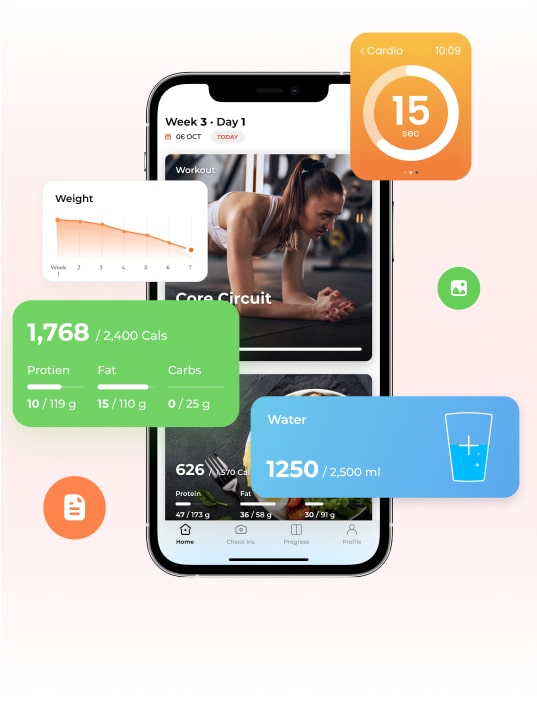Are You Earning Up to Your Potential?
Most personal trainers are undervaluing their time and skills. Our Personal trainer Revenue Calculator helps you find out what you should be making, and how to get there.
No guesswork. Just real numbers.
.jpg)
The fitness industry has changed dramatically over the last decade. What once relied on gym floor interactions, paper workout cards, and Excel spreadsheets has shifted into a fully digital experience. Today’s clients expect more—personal training apps that feel modern, easy to use, and built around their individual goals. For personal trainers, fitness coaches, and gym owners, this shift presents both a challenge and an opportunity.
Clients now ask: “Why can’t I get my workouts, diet plans, and progress tracking in the same app I already use to chat, shop, and pay bills?” That’s where a custom branded app comes in. It isn’t just about looking professional—it’s about meeting clients where they are, on their phones, and delivering all the features of custom fitness app for clients in one app—a dedicated mobile app that centralizes their fitness experience. A well-designed mobile app is essential for user engagement and convenience, ensuring clients have everything they need in one place. Among these, the basic features are the core functionalities every fitness app should have, such as activity tracking and progress monitoring.
So, what should a personal trainer app include? At minimum, it needs to combine workout plans, nutrition tracking, progress tracking, in app messaging, push notifications, and seamless communication. Activity tracking is also an essential feature, allowing users to monitor their progress and stay motivated. These are the fitness app must-haves for coaches—the tools that turn a static program into a dynamic coaching experience. But a truly successful fitness app goes further, adding specialized features like wearable device integration, real time insights, and community support.
This blog will break down the client-facing fitness app features list in detail. Each section answers a question trainers ask when choosing a digital platform. Whether you’re just starting out or ready to scale to unlimited clients, you’ll see exactly what it takes to build a powerful app that supports your business and keeps clients engaged.
{{gyms-bio-form-v2="/blog-bio-comp-v2"}}
How Does a Personal Training App Replace Spreadsheets?
For years, personal trainers have relied on spreadsheets or PDFs to deliver exercise plans. While this method works in the short term, it quickly becomes inefficient as the client base grows. Spreadsheets can’t send reminders, track performance, or adapt to changing fitness goals. Clients often lose motivation because they can’t visualize their progress, and trainers waste hours making manual updates.
A personal training app solves this problem by transforming static files into dynamic, interactive workout plans. Instead of opening an Excel sheet, clients log into a fitness app where every workout is organized, easy to follow, and enriched with video tutorials. They can view exercise history, see which weights they used last week, and check upcoming training programs—all inside a single custom branded app. The app helps users manage their fitness data, routines, and progress much more effectively than spreadsheets, offering features like progress tracking and routine adjustments.
Why Personalized Workout Plans Matter
The best personal training apps don’t just provide generic routines. They adapt to each individual’s personal preferences and current fitness level. For example:
- A beginner client might get simple bodyweight exercise plans with clear instructions and progressions.
- An advanced athlete might follow a periodized strength program with advanced training programs and performance metrics.
In both cases, the app tracks every rep, set, and rest period. This makes coaching far more effective than handing out a spreadsheet—because the app doesn’t just tell clients what to do, it helps them stay motivated and consistent.
What Should a Personal Trainer App Include for Workout Planning?
To deliver value, your app should have these fitness app must-haves for coaches:
- Customizable workout plans with flexibility for different goals.
- Integrated video tutorials to ensure correct form.
- Automatic real time progress tracking tied to exercise history.
- A user-friendly interface that works for both you and your clients.
A client-facing fitness app features list always begins with workouts—because without smart programming, everything else falls apart. And with FitBudd, trainers can easily scale from one client to unlimited clients, delivering personalized training with minimal effort.
How Does Progress Tracking Motivate Clients to Stay Consistent?
One of the biggest challenges in the fitness industry is keeping clients consistent. Motivation naturally fluctuates, but when clients can see their results, they’re more likely to stick with their fitness journey. That’s why progress tracking is one of the most important features of custom fitness app for clients.
With a personal training app, clients don’t just record their workouts—they can visualize improvements. The app stores their exercise history, tracks weights lifted, shows changes in running times, or highlights personal records. Every completed workout builds momentum, turning progress into a motivating feedback loop.
Why Real-Time Insights Matter

Unlike spreadsheets, a fitness app provides real time progress tracking. Clients can check their performance instantly after a session, while trainers can monitor progress and make adjustments on the fly. This creates a coaching environment where support is immediate, not delayed until the next check-in.
How Wearable Device Integration and Apple Health Improve Progress Tracking

The integration of wearable devices makes this even more powerful. A custom branded app that syncs with Apple Health or Fitbit enables users to automatically pull in heart rate, step count, and calories burned. These numbers turn into detailed reports that give both clients and trainers a full picture of health—not just gym performance.
How Trainers Use Progress Tracking to Coach Better
For personal trainers and fitness coaches, having access to real time insights changes everything:
- Spot trends in client performance.
- Adjust training programs when progress stalls.
- Send encouragement through in app messaging or push notifications when milestones are hit.
This is why fitness app must-haves for coaches always include strong tracking systems. It enables users to clearly see how their effort translates into results, they’re more likely to stay engaged. And when trainers have the data, they can coach clients with precision—delivering top notch service that keeps retention high.
Why Are Customized Diet Plans and Nutrition Tracking Essential in a Personal Training App?
Even the most carefully designed workout plans fall short without proper nutrition. For clients to achieve their fitness goals, they need support with what they eat just as much as how they train. That’s why customized diet plans and nutrition tracking are among the most important features of custom fitness app for clients.A well-built fitness app doesn’t just give exercises—it also delivers meal plans and personalized nutrition plans. This helps clients align their daily food choices with their health goals, whether that’s fat loss, muscle gain, or improved overall wellness.
Key Nutrition Features in a Client-Facing Fitness App
A complete client-facing fitness app features list for nutrition should include:
- Customized diet plans based on preferences (vegan, keto, etc.).
- Daily and weekly meal plans created by trainers or nutritionists.
- A barcode scanner to log foods quickly and accurately.
- Nutrition tracking to monitor calories, macros, and hydration.
These helpful features not only make tracking easier but for fitness professionals but also give clients ownership of their habits. When individual users can see how their food choices align with workouts, they’re more likely to stay motivated and consistent.
Advanced Features That Set Apps Apart
The best personal training apps go a step further by connecting with wearable device integration. Calories burned during workouts can be synced automatically with calorie intake from nutrition tracking, creating real time insights for both trainers and clients. This complete loop ensures that training and diet are always aligned.
Some apps also include mental wellness prompts—reminders to hydrate, rest, or check in with mental health. These small touches help clients manage their whole lifestyle, not just their time in the gym.
Why This Matters for Trainers
For personal trainers and fitness coaches, offering customized diet plans inside a branded app builds credibility. It shows you’re providing top notch service, not just workouts. More importantly, it increases user retention—clients are less likely to drop off when they see results fueled by both training and nutrition.
In short, what should a personal trainer app include? Strong nutrition tracking alongside workouts—because fitness and nutrition are two sides of the same coin.
💪 Got an idea for a brand? Let's bring it to life.
Launch your own fitness app with FitBudd in minutes!

💪 Got your brand name? Let’s bring it to life.
Launch your own fitness app with FitBudd in minutes!


88% trainers worldwide gave us 5 stars
Transform your fitness business with the power of your branded app on iOS and Android.
Try for FREEHow Does Seamless Communication Improve Client Management in a Fitness App?
relationships. For clients to stay motivated, they need regular encouragement, accountability, and quick answers to their questions. That’s why seamless communication is one of the most critical features of custom fitness app for clients. These features help trainers and clients stay connected, ensuring ongoing engagement and motivation even outside of direct coaching sessions.
Instead of juggling emails, text messages, and WhatsApp groups, trainers can handle all communication inside a powerful app. With in app messaging, clients can check in, ask questions, or share updates instantly. Trainers, on the other hand, can respond within the same platform, making the coaching experience smoother and more professional.
Why Push Notifications Matter
Push notifications are another game-changer. They serve as gentle nudges—reminding clients to log meals, complete workouts, or celebrate milestones. Unlike emails that get lost in inboxes, notifications appear directly on a client’s phone, creating immediate engagement. This simple feature significantly improves user retention because clients feel supported in real time.
Streamlined Client Onboarding
First impressions matter. A strong client onboarding process ensures new clients understand how to use the app, track workouts, and communicate with their coach. By delivering a clear onboarding journey in the same app, trainers reduce confusion and increase client confidence.
How Trainers Benefit from Better Client Management
For personal trainers and fitness coaches, seamless communication simplifies client management. It keeps all records—messages, progress updates, and feedback—in one place. That means trainers can manage unlimited clients more efficiently while still maintaining a personal connection.
In short, what should a personal trainer app include? Tools that allow easy, professional communication—because accountability and support are just as important as sets and reps.
Why Does Branding and Personalization Matter in a Personal Training App?
In today’s fitness industry, clients are drawn to experiences that feel professional, personal, and consistent. A custom branded app does more than deliver workout plans or nutrition tracking—it communicates your brand identity every time a client logs in.
A branded app ensures your coaching doesn’t look generic. Instead of using a third-party platform where your name is hidden, clients see your logo, your colors, and your tone. This creates trust and positions you as an authority, not just another trainer offering cookie-cutter programs.
Personalization Beyond the Logo
Branding isn’t only visual—it’s about personalization. Clients want experiences tailored to them. That means dashboards that highlight their fitness goals, push notifications written in your voice, and progress updates that celebrate their milestones. The best apps in the market understand this balance between personal and professional.
Community and Engagement
Strong branding also creates community. Features like community support groups and social sharing allow clients to connect with each other, celebrate wins, and stay engaged. This sense of belonging boosts user retention, because clients don’t just feel like they’re using a tool—they feel like they’re part of a tribe led by you.
When trainers combine personalization with a branded app, they elevate their services from standard to premium. And that’s exactly what separates average trainers from leaders in the fitness industry.
What Are the Key Features of Custom Fitness App for Clients That Coaches Must Include?
If you’ve ever wondered “what should a personal trainer app include?”, the answer lies in balancing essential features, advanced features, and specialized features. A great app isn’t just a place to upload workouts—it’s a platform that supports clients from onboarding to results. That’s why defining the fitness app must-haves for coaches is critical before choosing the right solution.
Essential Features: The Non-Negotiables
Every client-facing fitness app features list starts with the basics:
- Workout plans and exercise history for structure.
- Progress tracking and real time insights for motivation.
- Nutrition tracking with customized diet plans and meal plans.
- In app messaging and push notifications for accountability.
- Smooth client onboarding to set expectations from day one.
These are the minimum requirements for a successful fitness app—without them, your tool is just another spreadsheet in disguise.
Advanced Features: For Coaches Who Want More
To compete with the best personal training apps, your solution should also include:
- Wearable device integration with Apple Health and Fitbit.
- Automated detailed reports for clients and coaches.
- Flexible subscription models to scale revenue streams.
- Integration with studio tools for client management.
These elevate your service beyond basic coaching, making your app a powerful app for growth.
Specialized Features: The Differentiators
Finally, the features that truly set you apart:
- Community support for peer motivation.
- Social sharing to celebrate wins.
- Mental health check-ins to support holistic wellness.
- Video tutorials for exercise confidence.
When combined, these features turn an app into a full-service coaching ecosystem. FitBudd bundles these fitness app must-haves for coaches into a single custom branded app—helping trainers serve unlimited clients while delivering top notch service.
Technical Requirements for Building a Custom Fitness App
Building a custom fitness app that stands out in today’s competitive market means going beyond just great features—it requires a solid technical foundation. Whether you’re a personal trainer, fitness professional, or gym owner, understanding the technical requirements behind your app is essential for delivering a seamless, secure, and scalable experience to your clients.
Security, Compliance, and Data Privacy
When it comes to personal trainer apps and fitness apps, protecting your clients’ data is non-negotiable. A successful fitness app must implement robust security measures, such as end-to-end encryption and secure authentication, to keep sensitive information safe. Compliance with regulations like GDPR and HIPAA is crucial, especially when handling health and personal data. Fitness professionals and personal trainers should ensure their app partner prioritizes secure data storage and transmission, so clients can trust that their progress tracking, nutrition plans, and personal details are always protected. By making security and privacy a top priority, you not only safeguard your business but also build lasting trust with your clients.
Scalability and Performance Considerations
As your fitness business grows, your app needs to keep up. A successful fitness app is built with scalability in mind, allowing you to serve unlimited clients without sacrificing performance. This means choosing the right infrastructure, optimizing database performance, and using efficient caching to ensure real time progress tracking and feedback are always available. Whether you’re tracking hundreds or thousands of users, your app should deliver a smooth, lag-free experience—so clients can monitor their fitness journey and trainers can manage their business with confidence. Investing in scalable technology ensures your app can grow alongside your ambitions.
Integration with Third-Party Services and APIs
To deliver the best personal training apps experience, integration with third-party services and APIs is key. Connecting your fitness app with wearable devices—like those compatible with Apple Health or Google Fit—enables users to automatically sync activity data, making progress tracking effortless. Social sharing features let clients celebrate milestones and build community, while integrations with other popular platforms can streamline everything from payments to scheduling. By leveraging these integrations, your app becomes more powerful, user-friendly, and engaging—helping you stand out among the best apps in the fitness industry.
Development and Design: Creating a User-Friendly Fitness App
A truly effective fitness app isn’t just packed with features—it’s designed with the user in mind from the very first tap. Creating a user-friendly app means focusing on intuitive navigation, engaging visuals, and a seamless experience that keeps clients coming back for more.
UI/UX Principles for Fitness Apps
The best personal trainer apps and fitness apps are built on strong UI/UX principles. This means every screen is easy to navigate, every button is clear, and every feature is accessible—whether you’re a personal trainer managing multiple clients or an individual tracking your own progress. Using simple, direct language and visual cues like charts and graphs helps users track progress at a glance, making the app both informative and motivating.
A custom branded app should reflect your unique style and brand colors, reinforcing your identity every time a client logs in. Personalization goes beyond visuals—tailoring dashboards, notifications, and feedback to each user’s fitness goals and preferences boosts user retention and satisfaction. By prioritizing a user-friendly design, you ensure your branded app not only looks professional but also delivers a top notch service that keeps clients engaged and loyal.
In short, investing in thoughtful development and design transforms your fitness app from just another tool into a powerful extension of your fitness business—one that helps both you and your clients achieve lasting success.
How Does a Custom Fitness App Drive Business Growth for Trainers?
A successful fitness app isn’t just a client tool—it’s a business engine. For personal trainers, fitness coaches, personal coaches, and gym owners, as well as other businesses and fitness businesses, the right app unlocks growth by improving efficiency, increasing retention, and creating new revenue streams. These platforms help businesses and fitness businesses scale, manage client engagement, and automate processes to support ongoing growth.
Scaling Beyond One-on-One Coaching
Traditionally, trainers were limited by hours in the day. But with a custom branded app, you can serve unlimited clients without working longer hours. Features like automated client management, in app messaging, and progress tracking let you deliver the same high-quality service to 50 clients as you would to 5.
Opening New Revenue Streams
A modern fitness app supports flexible subscription models—from monthly memberships to premium studio plans. Trainers can upsell specialized features like customized nutrition coaching, small-group programs, or advanced analytics. Each add-on becomes a new income stream, boosting overall business growth.
Increasing Retention with Top Notch Service
The average trainer spends heavily on marketing to get new clients, but retention is where profits really grow. A powerful app improves user retention by keeping clients engaged with push notifications, seamless communication, and real time insights. Clients stay longer because they see results and feel supported every step of the way.
In short, a successful fitness app helps trainers scale smarter, not harder. With FitBudd, you don’t just get an app—you get a business partner designed to fuel growth while helping you deliver top notch service to every client.
Step-by-Step Roadmap to Fitness App Development and Launch With Your First 10 Clients
The idea of fitness app development can feel intimidating—many trainers assume they’ll need coding skills, a big budget, or months of setup. In reality, launching your own custom branded app is faster and easier than ever. With the right platform, you can start with just 10 clients and grow from there.
Step 1: Set Up Your App
Choose a platform like FitBudd that handles the tech side for you. Instead of hiring developers, you get a ready-to-launch branded app with your logo, colors, and identity.
Step 2: Build Workout and Nutrition Plans
Upload workout plans, exercise plans, and nutrition plans tailored to your first 10 clients. Use templates where possible, then personalize them to fit personal preferences and fitness goals.
Step 3: Onboard Clients Smoothly
Use a structured client onboarding process—send them login details, walk them through features, and explain how to track workouts and meals. A smooth start increases confidence and long-term commitment.
Step 4: Engage Through Seamless Communication and Social Sharing
Keep clients active with in app messaging, push notifications, and milestone celebrations. Strong seamless communication helps clients stay motivated and engaged.
Step 5: Scale to Unlimited Clients
Once you’ve mastered 10, the same system works for 100. With FitBudd, you can manage unlimited clients using automated client management, progress reports, and group features—without adding more hours to your day.
By following this roadmap, trainers move from idea to launch quickly, building a successful fitness app that grows their business while delivering top notch service.
Conclusion: Build a Successful Fitness App Today
So—what should a personal trainer app include? The answer is clear. A successful fitness app combines the essentials (workout plans, nutrition tracking, progress tracking, in app messaging) with advanced features like wearable device integration, real time insights, and subscription models. Add specialized features such as community support, mental health prompts, and social sharing, and you have everything needed to keep clients engaged and motivated.
This complete client-facing fitness app features list isn’t just about helping clients reach their fitness goals—it’s also about fueling business growth for trainers. When you offer a custom branded app, you’re not just giving clients another tool; you’re delivering a premium experience that boosts user retention and opens new revenue streams.
The fitness app must-haves for coaches are no longer optional—they’re the standard in today’s digital-first fitness industry. Trainers who embrace this shift will scale faster, serve unlimited clients, and stand out among the best personal training apps available.
With FitBudd, you don’t have to worry about fitness app development or tech headaches. You get a ready-to-launch branded app packed with all the must-have features, designed to help you coach smarter and grow faster.
👉 Ready to give your clients the experience they deserve?
Start your free 30-day trial with FitBudd today and build the successful fitness app your business needs to thrive
Frequently Asked Questions
A custom fitness app for clients should include workout plans, progress tracking, nutrition tracking, in app messaging, and push notifications. Advanced features like wearable device integration, Apple Health sync, and community support make it more engaging and help with client retention.
A personal trainer app should include essential tools like customizable workout plans, exercise history, real time progress tracking, customized diet plans, and seamless communication. These features turn static coaching into a dynamic and personalized experience.
Traditional fitness app development can take months, depending on complexity. But platforms like FitBudd allow trainers to launch their own branded app quickly—sometimes in just a few days—without the cost or hassle of custom coding.
The best apps for personal trainers combine client management, workout and nutrition delivery, progress tracking, and branding. FitBudd stands out because it lets trainers create a custom branded app, serve unlimited clients, and unlock new revenue streams with ease.

Ultimate Marketing Guide for Fitness Trainers
Boost your business growth with these tried and tested marketing strategies. Free for you to download.
Download Now
Templates
These functional templates have the power to make any fitness trainer's life easier.
Subscribe To
Our Blog






























